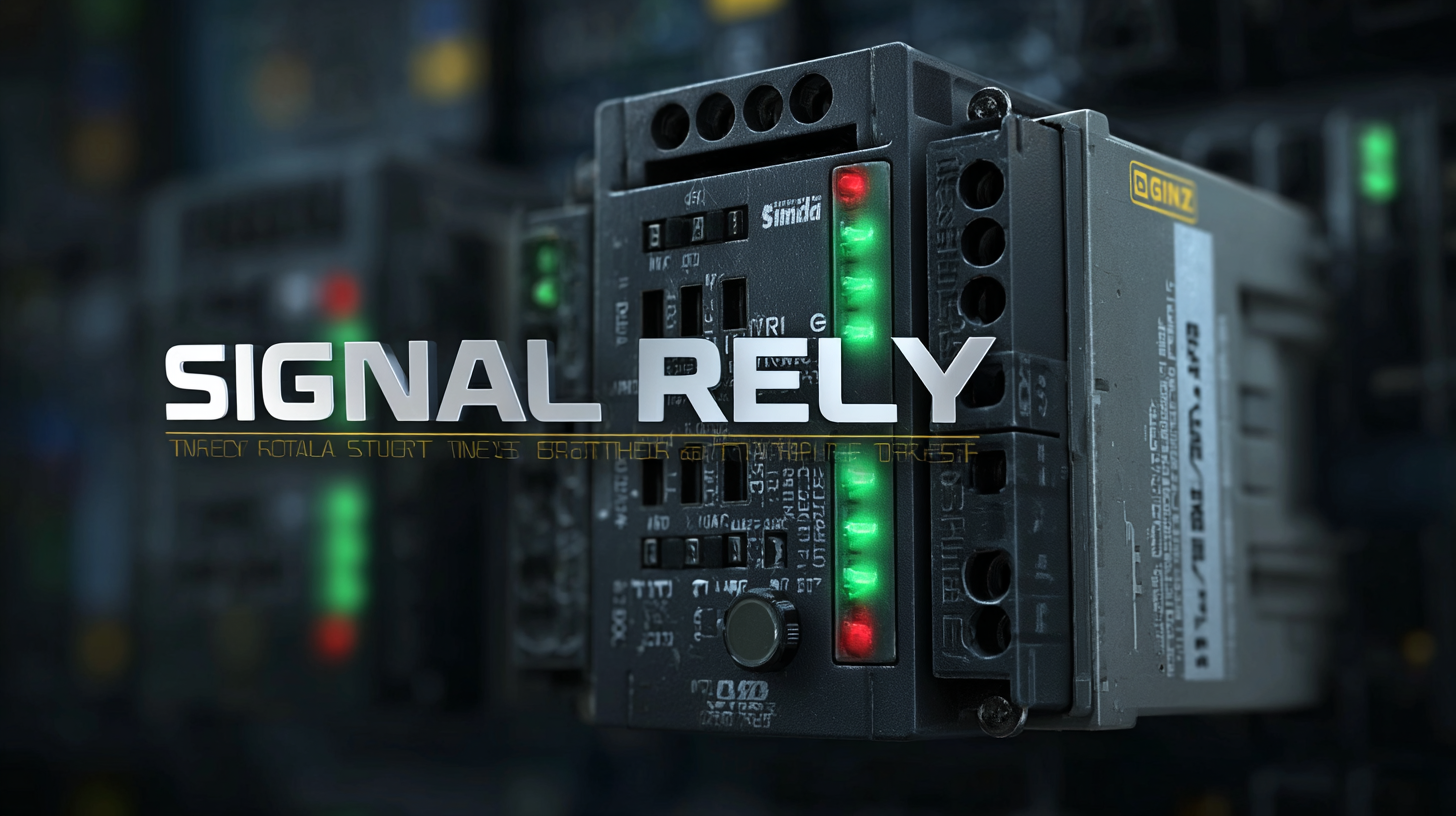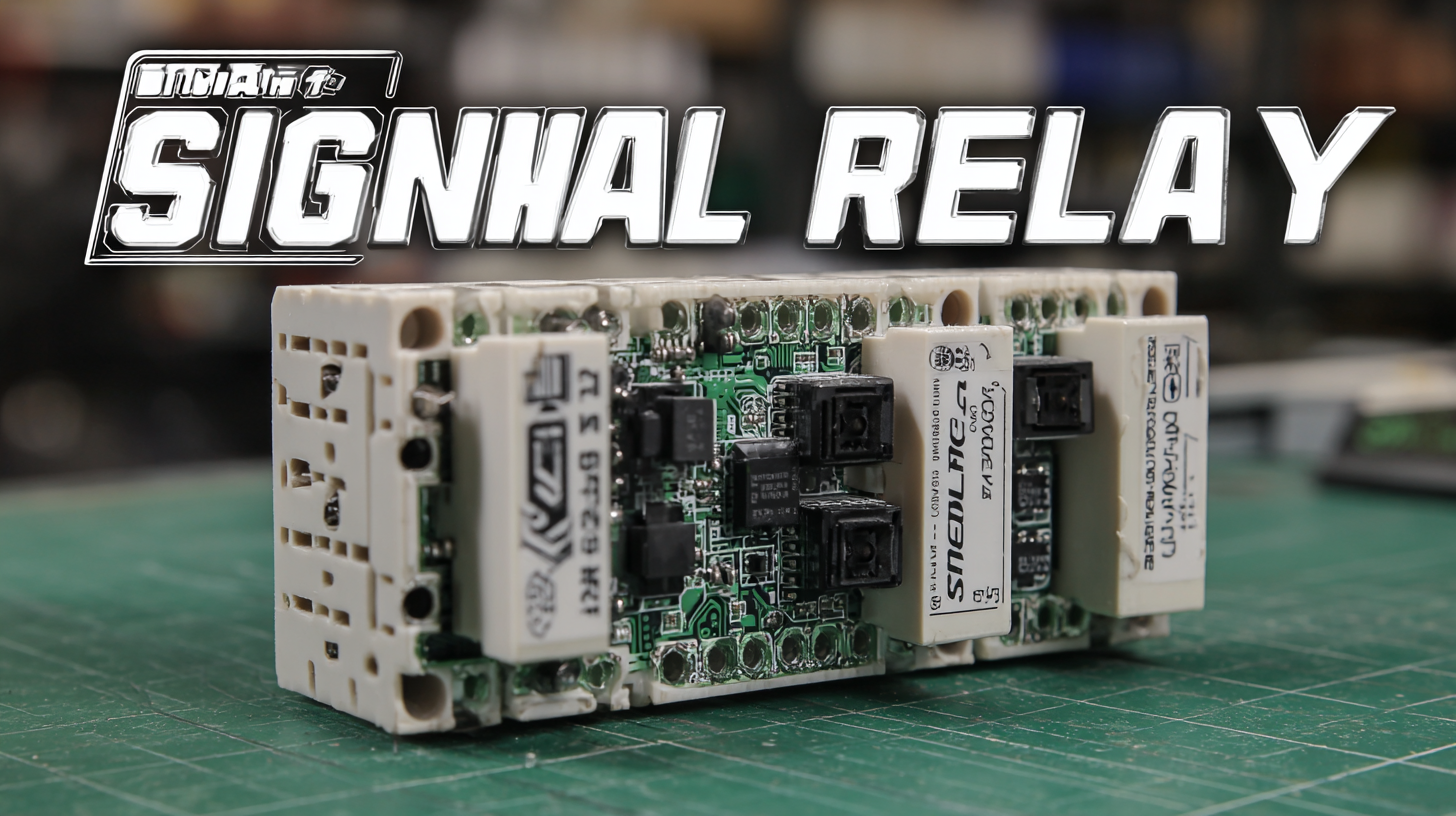In the fast-evolving world of industrial automation, the significance of selecting the right signal relay cannot be overstated. According to a report from MarketsandMarkets, the global relay market is projected to reach $24.2 billion by 2027, highlighting the growing demand for efficient and reliable signal relay solutions in various sectors. Businesses are increasingly relying on signal relays to ensure optimal performance and safety in their operations, making the choice of the right signal relay a crucial decision. Whether it's for controlling machinery, protecting circuits, or enhancing communication systems, the right signal relay can significantly impact operational efficiency and reliability.

In this blog, we will explore the ultimate strategies for choosing the best signal relay tailored to your business needs, ensuring you make informed decisions that align with industry standards and technological advancements.
 Signal relays play a crucial role in a variety of business applications, from industrial automation to telecommunications. Understanding the different types of signal relays can help you choose the right one for your specific needs. There are electromagnetic relays, solid-state relays, and thermal relays, each with distinct advantages. Electromagnetic relays are versatile and commonly used for general switching applications, while solid-state relays offer high reliability and fast switching speeds, making them ideal for sensitive electronic circuits. Thermal relays, on the other hand, are designed to protect against overheating in electrical systems.
Signal relays play a crucial role in a variety of business applications, from industrial automation to telecommunications. Understanding the different types of signal relays can help you choose the right one for your specific needs. There are electromagnetic relays, solid-state relays, and thermal relays, each with distinct advantages. Electromagnetic relays are versatile and commonly used for general switching applications, while solid-state relays offer high reliability and fast switching speeds, making them ideal for sensitive electronic circuits. Thermal relays, on the other hand, are designed to protect against overheating in electrical systems.
When selecting a signal relay, consider the key parameters such as load current, switching voltage, and response time. Tip: Always check the relay's data sheet for maximum ratings to avoid overloading. Additionally, think about environmental conditions like temperature and humidity, as these factors can impact relay performance. Tip: Opt for relays with protective enclosures if you plan to use them in harsh environments. Properly evaluating these aspects can ensure that your business leverages the full potential of signal relays for efficient operations.
When selecting a signal relay for your industry, it's crucial to consider several key factors that can significantly impact its performance and reliability. First and foremost, you should evaluate the operating environment. Factors such as temperature fluctuations, humidity levels, and potential exposure to dust or corrosive substances can dictate the type of relay you need. For instance, if your business operates in a harsh environment, a relay with an IP rating for dust and water resistance will ensure durability and reduce maintenance costs.
Additionally, compatibility with existing systems is another essential consideration. Ensure that the relay's specifications align with your current equipment to avoid integration issues. This includes checking the voltage levels, current ratings, and signal types. Lastly, the relay's switching capacity should match or exceed the demands of your application. Understanding the expected load and frequency of operation can help you choose a relay with an appropriate lifecycle and minimize the risk of failure. By focusing on these critical factors, you can select a signal relay that enhances operational efficiency and meets the unique needs of your business.
When it comes to selecting the best signal relay for your business, understanding compliance and the nuances of import and export certifications is crucial. According to a report by the International Trade Administration, over 80% of companies that fail to adhere to compliance regulations in foreign markets experience delays and increased costs. This emphasizes that a solid grasp of relevant certifications—such as CE, FCC, and RoHS—is not only beneficial but necessary for smooth operations and market entry.
Navigating the labyrinth of compliance requirements can save businesses from costly legal ramifications. For instance, research from Compliance & Risks indicates that companies in the electrical and electronic sectors that secure and maintain their certifications can reduce their market entry delays by up to 30%. By prioritizing compliance and understanding the significance of certifications, businesses can not only enhance their reputation but also position themselves more competitively in the global market, ultimately ensuring that they select the right signal relay solutions tailored to their operational and regulatory needs.
In today's rapidly evolving technological landscape, selecting the right signal relay is crucial for businesses across various sectors. Case studies reveal that sectors like telecommunications and energy have reaped substantial benefits from strategic relay implementations. A report from the International Energy Agency (IEA) indicates that HVAC systems equipped with advanced relays can improve energy efficiency by up to 20%. This enhancement not only reduces operational costs but also promotes sustainability—a key performance indicator for modern businesses.
Moreover, in the telecommunications industry, a case study published by the Telecommunications Industry Association (TIA) highlighted that upgrading to smarter relay systems improved network reliability by 30%. Businesses that adopted these innovative relays reported fewer system outages and enhanced data transmission speeds, confirming that the right relay choices can significantly impact operational success. As companies navigate their specific industry challenges, these notable implementations serve as clear examples of how investing in the best signal relay can lead to transformative results.

As we look toward the future of signal relay technology, it's evident that innovations are dramatically reshaping the landscape. One of the most significant trends is the emergence of smart relays equipped with advanced communication protocols. These state-of-the-art devices not only enhance control and monitoring capabilities but also integrate seamlessly with IoT ecosystems. Smart relays can provide real-time data analytics, allowing businesses to optimize their operations and improve efficiency.
Another noteworthy innovation is the shift towards more environmentally friendly relay technologies. Manufacturers are increasingly focusing on producing relays that consume less power and utilize sustainable materials. The push for green technology aligns with global standards aimed at reducing carbon footprints and promoting energy efficiency. Such advancements not only benefit the environment but also resonate with customers and stakeholders who prioritize sustainability.
Furthermore, the adoption of standardized interfaces and protocols is paving the way for interoperability. As the demand for streamlined communication between devices continues to grow, having universal standards ensure that various systems can work together without compatibility issues. This trend not only simplifies the integration process but also enhances scalability, allowing businesses to adapt to technological changes rapidly.
| Parameter | Standard | Technology Type | Typical Application | Future Trends |
|---|---|---|---|---|
| Voltage Rating | IEC 61810-1 | Electromechanical | Industrial Controls | Smart Relays |
| Current Rating | UL 508 | Solid State | Automotive Systems | Integration with IoT |
| Response Time | JIS C 5371 | RFID | Telecommunication | AI-Driven Analytics |
| Size & Form Factor | EN 61000-6-3 | Miniature Relays | Consumer Electronics | Sustainable Design |
| Environmental Rating | IEC 60664-1 | Hermetically Sealed | Aerospace | Advanced Materials |
TradeManager
Skype
VKontakte

